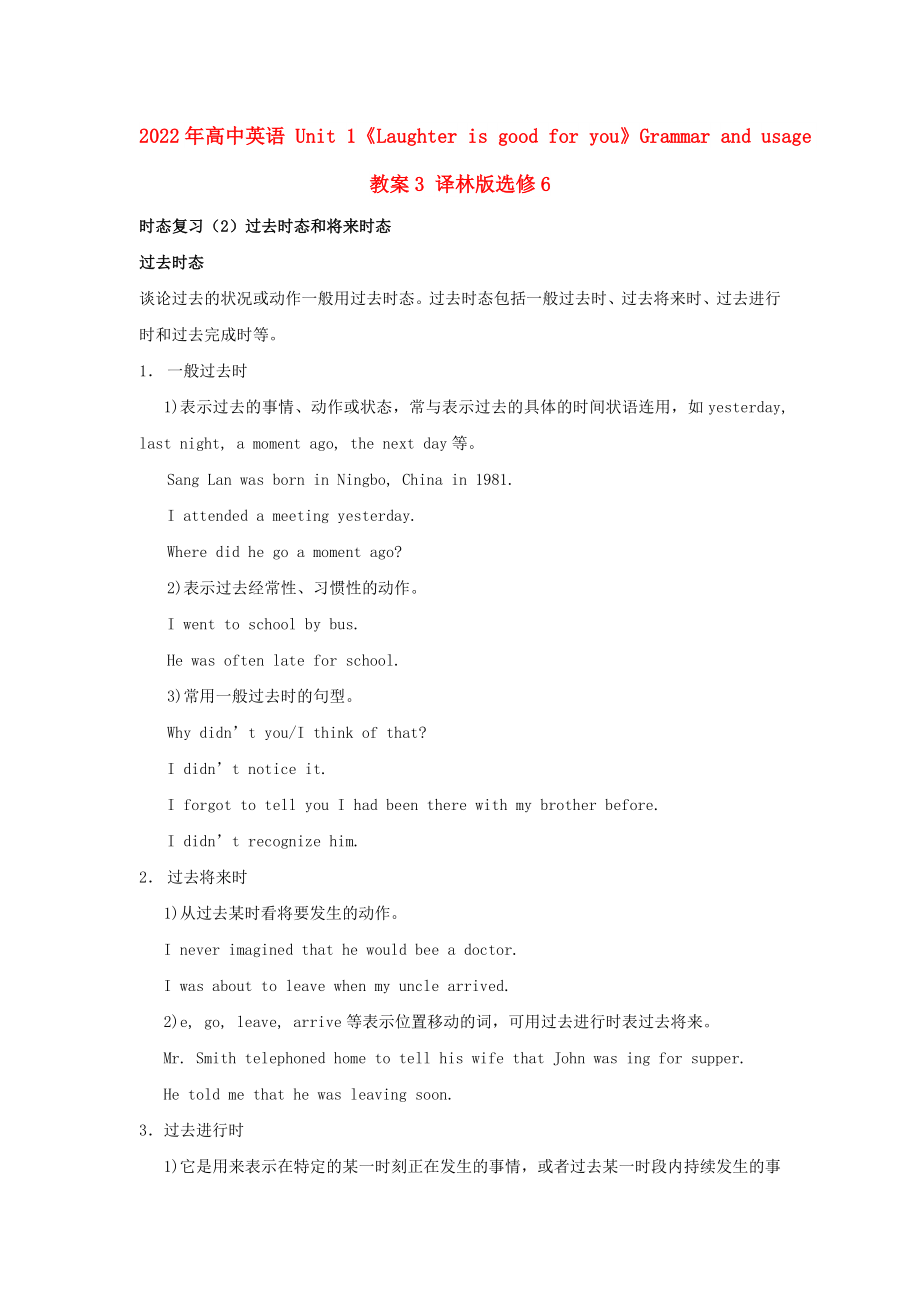《2022年高中英語(yǔ) Unit 1《Laughter is good for you》Grammar and usage教案3 譯林版選修6》由會(huì)員分享�,可在線閱讀,更多相關(guān)《2022年高中英語(yǔ) Unit 1《Laughter is good for you》Grammar and usage教案3 譯林版選修6(3頁(yè)珍藏版)》請(qǐng)?jiān)谘b配圖網(wǎng)上搜索�����。
1、2022年高中英語(yǔ) Unit 1《Laughter is good for you》Grammar and usage教案3 譯林版選修6
時(shí)態(tài)復(fù)習(xí)(2)過(guò)去時(shí)態(tài)和將來(lái)時(shí)態(tài)
過(guò)去時(shí)態(tài)
談?wù)撨^(guò)去的狀況或動(dòng)作一般用過(guò)去時(shí)態(tài)�。過(guò)去時(shí)態(tài)包括一般過(guò)去時(shí)、過(guò)去將來(lái)時(shí)�、過(guò)去進(jìn)行時(shí)和過(guò)去完成時(shí)等。
1. 一般過(guò)去時(shí)
1)表示過(guò)去的事情��、動(dòng)作或狀態(tài)��,常與表示過(guò)去的具體的時(shí)間狀語(yǔ)連用�����,如yesterday, last night, a moment ago, the next day等����。
Sang Lan was born in Ningbo, China in 1981.
I attended a
2、 meeting yesterday.
Where did he go a moment ago?
2)表示過(guò)去經(jīng)常性����、習(xí)慣性的動(dòng)作。
I went to school by bus.
He was often late for school.
3)常用一般過(guò)去時(shí)的句型��。
Why didn’t you/I think of that?
I didn’t notice it.
I forgot to tell you I had been there with my brother before.
I didn’t recognize him.
2. 過(guò)去將來(lái)時(shí)
1)從過(guò)去
3�、某時(shí)看將要發(fā)生的動(dòng)作。
I never imagined that he would bee a doctor.
I was about to leave when my uncle arrived.
2)e, go, leave, arrive等表示位置移動(dòng)的詞�,可用過(guò)去進(jìn)行時(shí)表過(guò)去將來(lái)�����。
Mr. Smith telephoned home to tell his wife that John was ing for supper.
He told me that he was leaving soon.
3.過(guò)去進(jìn)行時(shí)
1)它是用來(lái)表示在特定的某一時(shí)刻正在發(fā)生的事情����,或
4���、者過(guò)去某一時(shí)段內(nèi)持續(xù)發(fā)生的事情。主要從點(diǎn)和段上來(lái)強(qiáng)調(diào)動(dòng)作的過(guò)去進(jìn)行時(shí)�。
What were you doing at nine last night?
I first met Lisa three years ago. She was working at the radio shop at that time.
2)表示過(guò)去某一階段內(nèi)一直在進(jìn)行的動(dòng)作。
I was reading a novel last night.
As she was reading the newspaper, her sister was doing her homework
5��、.
4.用過(guò)去完成時(shí)
1)在某一過(guò)去時(shí)間以前或過(guò)去某事之前已發(fā)生并完成的動(dòng)作�����。
By the end of last month they had treated 3,000 patients.
By the time she peted in the New York Goodwill Games, she had been a dedicated junior gymnast for eleven years.
2)表示一種未實(shí)現(xiàn)的愿望和想法����。
I had hoped to go on Monday, but I couldn’t get away.
I had though
6、t that he was our English teacher.
3)用與Hardly…when, Scarcely…when, No sooner…than句型中���。
Hardly had he finished his homework when we went home.
將來(lái)時(shí)態(tài)
談?wù)搶?lái)的狀況或動(dòng)作一般用將來(lái)時(shí)態(tài)����。將來(lái)時(shí)態(tài)包括一般將來(lái)時(shí)、將來(lái)進(jìn)行時(shí)和將來(lái)完成時(shí)等����。
1. 一般將來(lái)時(shí)
一般將來(lái)時(shí)表示將來(lái)發(fā)生的動(dòng)作或情況。常與表示將來(lái)的時(shí)間狀語(yǔ)連用�����,如tomorrow, next week等�。
She will e with us to watch a football
7、match tomorrow.
有幾種方法可以表示一般將來(lái)����。
(1) 用will或shall表示有關(guān)將來(lái)的信息
I know I will think about her whenever my life feels unbearable.
I shall work hard and learn to bee a gymnast.
(2)用be going to+動(dòng)詞原形表示將來(lái)的計(jì)劃和打算
Today, I’m going to talk about how to find happiness.
(3) be to+動(dòng)詞原形“按計(jì)劃、安排”就要發(fā)生
The li
8����、ne is to be opened to traffic on May Day.
(4) be about to表示即將要發(fā)生的事
He is about to retire.
2. 將來(lái)進(jìn)行時(shí)
表示將來(lái)某一時(shí)間點(diǎn)或時(shí)間段正在進(jìn)行的動(dòng)作。
Dr Brain will be talking about success next time.
What will you be doing at eight tomorrow evening?
I wonder if it will still be raining this afternoon.
3.將來(lái)完成時(shí)
表示將來(lái)某一時(shí)間之前已經(jīng)完成的動(dòng)作���,并往往對(duì)將來(lái)某一時(shí)間產(chǎn)生影響�����。
When you get home, you father will have left for America.
By the end of next month he will have finished his novel.
 2022年高中英語(yǔ) Unit 1《Laughter is good for you》Grammar and usage教案3 譯林版選修6
2022年高中英語(yǔ) Unit 1《Laughter is good for you》Grammar and usage教案3 譯林版選修6

